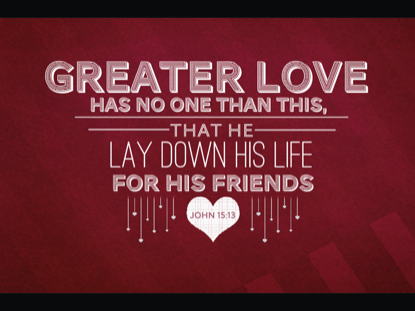In the name of the Easter season I’ve been spending some time in John’s Gospel story. I have to be in the right mood for Johnny. He gets all sentimental with flowery love language, telling his version of the story in a bit of an unusual way, compared to the other 3 accounts (called in the academic world the “synoptic Gospels”). I like the directness of Mark – he moves through the story as if it were a trip to the mall. “And then we, and then we, and then we...” And Matthew’s rich history underwritten into his texts. And Luke the Equalizer and his love for the poor and downtrodden. So, John is more the Love Child of the gospel stories and thus when I need to get out of the business of religion, I turn to his words.
Specifically, I love his writings on Jesus’ pre-death soliloquy. Chapter by chapter, you can’t read it in one sitting – it’s much too rich. Chapters 14-17 are best in small bites. Today’s nibble that caught me was 15:13.
[box] “Greater love has no one than this, that one lay down his life for his friends.”[/box]
Now, I’ve always identified more as the one who received the love that cost life. Jesus died for me, so I’m receiving the Greatest Love. What a gift. Thank you Jesus, you shouldn’t have. I need to write a thank you note.
But today I dug out my 8th grade English skills and diagrammed this verse and realized I’ve been reading it all wrong. It’s hard in our murky English language with misplaced modifiers and gender-neutral language to completely understand it, but I’m fairly positive I’ve understood it backward.
While, yes, the beloved friends in the verse do reap benefit, they’re not experiencing the Greatest Love. That warm fuzzy is a mere bi-product. The Greatest Love goes to “the one” who is giving – giving the love, laying down the life. While we might feel special, we ought not feel as if we’ve achieved the Greatest of all Loves. We’ve simply been in relationship with one who has.
In our love-hungry culture, we frequently appeal to this desire to be loved. Look at our books and movies and find the undercurrent story of being pursued as the ultimate expression of love. I never watched it, but I believe 50 Shades appealed to a large audience because it played the strings of this desire to be the object of such a love. Christians, be careful – much of our language around dating, specifically for women, sings the same song. Be pursued. Wait patiently. It’s all very knight-in-shining-armor-y.
This narrative distorts the Greatest Love and leaves us hungry. When we devour romance novels and porn we taste something similar, but like saccharin, are not fulfilled. We’re dining on the wrong kind of love. We’re chasing a Receiving love. Jesus said we’ll be full when we begin to live a Giving Love.
Perhaps this is why God gave parenting as a gift and a practice. In this space, we’re thrust into Giving Love. We most certainly aren’t the Beloved of the relationship, and for many of us this might be the first time we’ve lost Beloved status. All of a sudden we’re Loving with costs, not just benefits.
Pair that with a culture that tells us that the measurement of our costly love is how our children turn out. Well-adjusted children become the measuring stick of love. No wonder all parents are neurotic. Because we’re seeing it backward. The beauty isn’t only in the Beloved. The real blessing is in the work of Giving Love.
The Easter season ought not be just a time to reflect on how much we are beloved, though we are and the day is a beautiful one to show gratitude. But it should be for us a time of year to focus on how we might be a Giver of love, someone who lays down one’s life.* If we stop at living the Beloved life, we’ll never actually experience the Greatest Love God has to offer.
*I appreciate and believe in the need for inclusive language. However, I also hate it and the way it can muck up a sentence.

